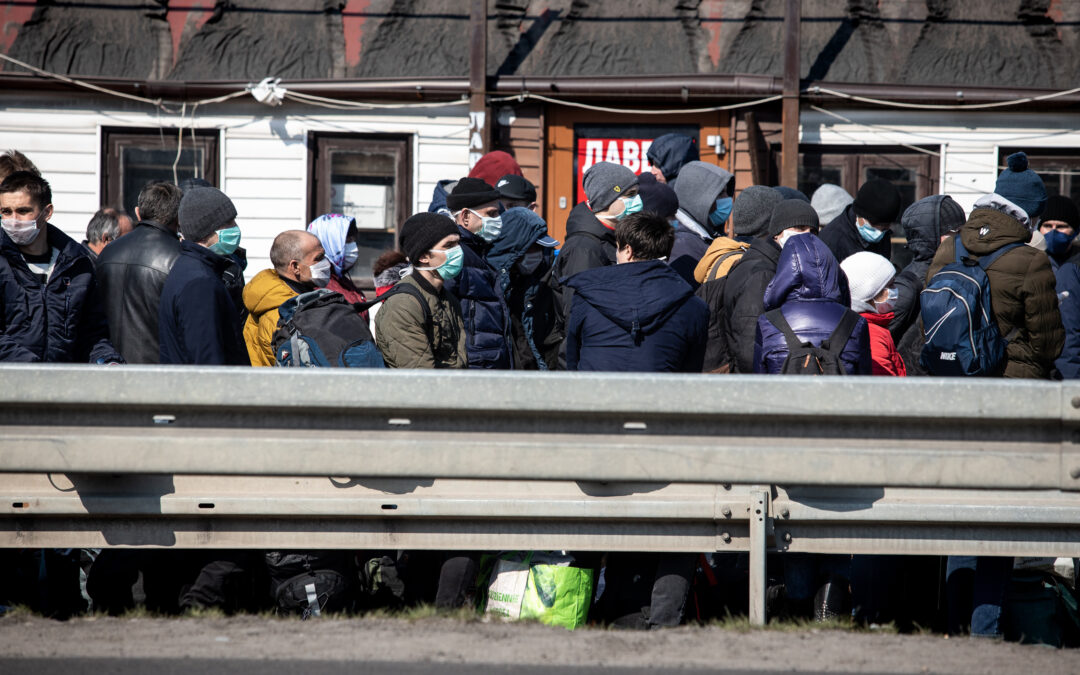Almost half a million foreigners reside in Poland with valid residence documents, an increase of 8% since last year, new data published by the state Office for Foreigners show. Poland has recently experienced levels of immigration that are unprecedented in its history and among the highest in the EU.
The new figure, of 457,000, does not include those in the country with temporary permissions or long-term visas, nor those who have not formalised their stay. A comprehensive estimate by Statistics Poland (GUS), a government agency, last year estimated that there were over two million foreigners living in Poland.
Among the foreigners with residence documents, over two-thirds come from neighbouring Ukraine (244,200 permits), Belarus (28,800) and Germany (20,500). Almost ten times as many Ukrainians as any other nationality received such a permit to settle in Poland in 2020.
They were followed by Russians (12,700) and Vietnamese (10,900), the latter of whom are Poland’s largest non-European group. The top ten is completed by immigrants from India, Italy, Georgia, China and the United Kingdom.
The number of Ukrainians with short-term and long-term residence permits in Poland rose by 29,400 in 2020. The next largest increases were among Belarusians (3,200), Georgians (2,400, making them the fastest growing group proportionally), Moldovans (1,200) and South Koreans (500).
📊 Ważne zezwolenia na pobyt w Polsce posiada obecnie prawie 460 tys. cudzoziemców. W ubiegłym roku liczba ta wzrosła o nieco ponad 34 tys. osób. Większość stanowią obywatele 🇺🇦 Ukrainy (244,2 tys. osób).
➡️ https://t.co/R9ivNuourJ#podsumowanie2020 #cudzoziemcy #daneUdSC pic.twitter.com/Z9W6pwIIqJ— Urząd do Spraw Cudzoziemców (@UdSC_gov_pl) January 28, 2021
The actual number of Ukrainians living in Poland at any one time is thought to be significantly higher. A 2019 report by the National Bank of Poland put the total figure at around 900,000, including short-term visits, estimating that they have contributed 11% of Poland’s GDP growth since 2014.
They have been by far the largest group of arrivals in Poland over recent years. Thanks to the influx of Ukrainians, Poland has led the EU for the past three years in terms of the number of first residence permits it has issued to non-EU immigrants.
Among the foreigners with residence documents, 60% have short-term permits, meaning that they may remain in Poland initially for up to three years; 22% have long-term residence cards; and 18% – 81,500 people – are EU citizens, a separate category.
The vast majority of short-term and long-term residence permits, 76%, were granted for work reasons, and a majority, 60%, of the foreigners with residence permits in Poland are aged between 18 and 40.
The most popular areas for longer-term immigrants to Poland are Warsaw and the Mazovia province that it is part of, where 119,000 people have residence permits, followed by the provinces where other large cities, Kraków and Poznań, are located.
Meanwhile, the Office for Foreigners have also reported that there were 32% fewer applications for refugee status or subsidiary protection in Poland in 2020 than in 2019. The drop is thought to have been caused by travel restrictions as a result of the COVID-19 pandemic.
By far the most applications came from Russians, with 1,283, followed by Belarusians (407) and Ukrainians (317). Applications from Belarusians rose sharply in the wake of August’s presidential elections in the country, which led to mass street protests and alleged repressions. From September, around 80 were received each month.
Almost 400 people were granted refugee status or subsidiary protection. The largest number came from Turkey (85 people), Belarus (81) and Russia (76). Around 2,000 Russians had their applications rejected or discontinued, however.
📊 W 2020 r. decyzje dot. ochrony międzynarodowej otrzymało 3,5 tys. cudzoziemców:
✅ warunki przyznania ochrony spełniało prawie 400 os.
❌ decyzje negatywne otrzymało 2,1 tys. os.
➖ ponad 1 tys. postępowań umorzono
➡️ https://t.co/PGMCRRLanG#podsumowanie2020 #cudzoziemcy pic.twitter.com/ZSzBVKLy0i— Urząd do Spraw Cudzoziemców (@UdSC_gov_pl) January 18, 2021
Main image credit: Jakub Orzechowski / Agencja Gazeta

Ben Koschalka is a translator, lecturer, and senior editor at Notes from Poland. Originally from Britain, he has lived in Kraków since 2005.




















